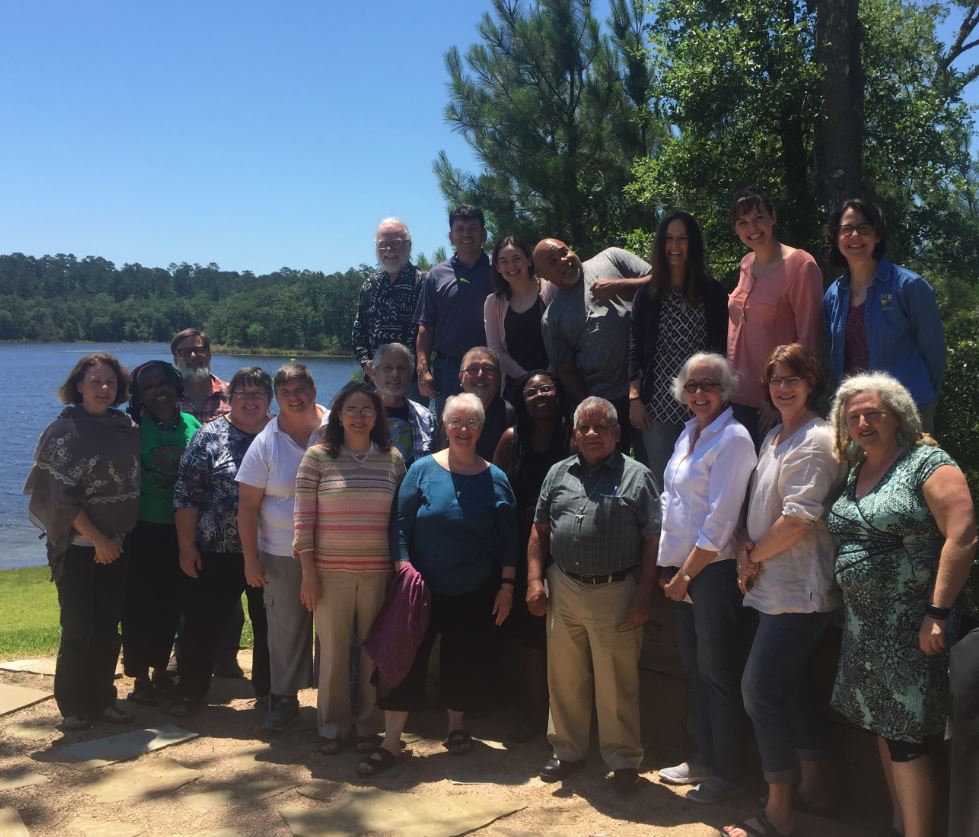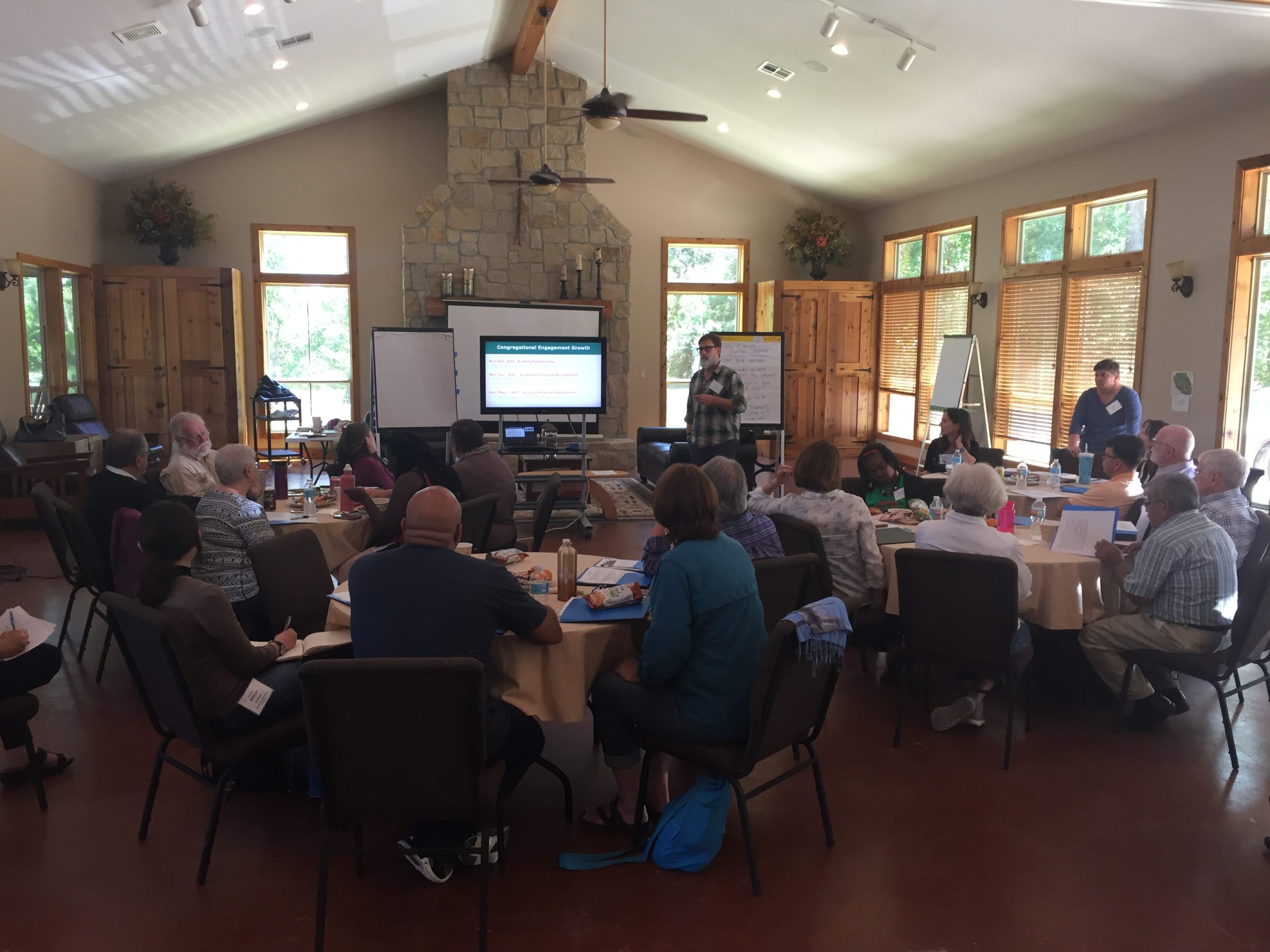
“Rooted in faith and active in hope, we strive to make partnering for healthy communities a part of every church’s DNA.”
Excerpt from EHF’s Kitchen Cabinet guiding statement
EHF has developed the Kitchen Cabinet, a group of diverse clergy and lay leaders from across the Diocese of Texas, to serve as advisors and ambassadors for the Foundation’s congregational engagement work to build healthier communities.
The Kitchen Cabinet met three times over the past year, each time learning more about EHF’s work, sharing insights on how to best support congregations, and assisting in the development of issue-based working groups to support congregations as they move to action through ministry in their community. The meeting in January 2017 resulted in the formation of four working groups to advance work on Mental Health, Poverty, Racial Reconciliation, and Civic Engagement/Community Organizing.
In May, EHF’s Kitchen Cabinet members came together to determine the best strategies to move the four working groups from ideas to action. They identified their roles as advisors, ambassadors and facilitators. Members also agreed on a guiding statement to solidify their purpose and motivations for representing their congregations and the Diocese of Texas.
The Way of Being guiding statement proclaims:
“Recognizing our Gospel’s call to seek and serve the Christ in all persons, the Kitchen Cabinet will listen, advise, and work to build healthy communities. The work of creating healthy communities is centered in dynamic spiritual formation that calls church and community into ongoing renewal. Rooted in faith and active in hope, we strive to make partnering for healthy communities a part of every church’s DNA.”

Kitchen Cabinet members met in working groups and provided specific recommendations for each area of work. Through careful facilitation, members used the results-based framework to establish a desired result and identify strategies EHF can use to engage and partner with congregations.
The meeting resulted in some concrete strategies and next steps:
Civic Engagement/Community Organizing
Work in the Civic Engagement/Community Organizing program will aim to ensure that congregations are active partners in building broader civic engagement in communities and in supporting public policies and practices that contribute to healthy communities. Members of this group proposed strategies to 1) strengthen existing organizing groups and their capacity to work with churches, 2) support congregations to work with partner groups and other congregations to identify and address community priorities through community organizing, and 3) provide clergy with support, training and reflection on civic engagement and community organizing.
Mental and Behavioral Health
Work in the Mental/Behavioral Health program will focus on mental health stigma reduction and increased access to peer support for people with mental health needs. Members of this group recommended continuing EHF’s Mental Health First Aid training and explore expanding the program to reach more community members. They also proposed strategies for helping congregations and communities better connect to and navigate the mental health system.
Poverty
The Poverty work is currently envisioned to target neighborhoods with Title 1 schools. A Title 1 designation is an indicator of a low-income community often affected by many aspects of poverty. Work in this area will aim to increase students’ educational achievement and opportunities for low-income families to secure living wages and family stability. Members of this group proposed strategies including creating community conversations and truth-telling events, host listening session where data is presented, provide on the ground orientation and training like Bridges Out of Poverty for congregations and communities, and advance community action.
Racial Reconciliation and Health
Work in the Racial Reconciliation and Health area will begin by addressing the history of race in Texas, which continues to create barriers to healthy equity. Members of this group proposed strategies to expand existing racial reconciliation formation offerings in the diocese, create space for courageous truth telling between ethnicities, and partner to advance reconciliation and racial equity in communities.
Kitchen Cabinet members will serve on the various working groups to share information about the work, connect interested congregations with EHF, and advance the planning and implementation of the work. You can connect with any of the Kitchen Cabinet members in your congregation or local area to explore ways to engage with EHF and discuss your ministry work to improve community health.
If your congregation is working in any of the program areas or is interested in beginning this or other community-engaged work, please contact us! We would love to discuss how EHF can help move your vision forward.
Kitchen Cabinet Participants
|
The Rev. Carissa Baldwin-McGinnis
St. Andrew’s Episcopal Church, Houston
|
The Rev. Alberto “Al” Melis St. Alban’s Episcopal Church, Waco |
|
The Rev. Ashley M. Cook
SFA College Mission
|
The Rev. Alejandro Montes Retired Priest, Houston |
|
The Rev. Dr. Mary Lenn Dixon
Deacon, Bryan-College Station
|
Ayesha Mutope-Johnson St. James Episcopal Church, Houston |
|
Ellie Hanley
Grace Episcopal Church, Galveston
|
The Rev. Eileen O’Brien Episcopal Canterbury Missioner, Houston |
|
Ryan Hawthorne
St. Stephen’s Episcopal Church, Houston
|
The Rev. Nandra Perry St. Philip’s Episcopal Church, Hearne |
| The Rev. Jim Liberatore St. Andrew’s Episcopal Church, Pearland |
The Rev. Kai Ryan
Episcopal Diocese of Texas
|
|
The Rev. Pedro Lopez
San Pedro Episcopal Church, Pasadena
|
Claire Soard St. Thomas’ Episcopal Church, Wharton |
|
Scott Madison
St. James Episcopal Church, Austin
|
Alyssa Stebbing Trinity Episcopal Church, The Woodlands |
| Jill McFarland Good Shepherd Episcopal Church, Austin | Dr. Paul Wick Christ Episcopal Church, Tyler |